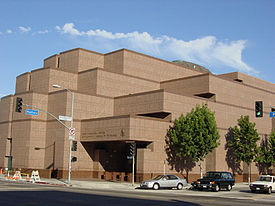 | |
 (2001) | |
| Named after | Simon Wiesenthal |
|---|---|
| Founded | 1977 |
| Founders | Simon Wiesenthal |
| Headquarters | Los Angeles, California, U.S. |
Key people | Marvin Hier, Abraham Cooper |
Revenue | US$25,359,129 (2018) |
| Expenses | US$26,181,569 (2018) |
| Staff | 136 (2016) |
| Website | www |
| Part of a series on |
| Antisemitism |
|---|
 |
|
|

The Simon Wiesenthal Center (SWC) is a Jewish[1] human rights organization established in 1977 by Rabbi Marvin Hier.[2][3][4] The center is known for Holocaust research and remembrance, hunting Nazi war criminals, combating anti-Semitism, tolerance education, defending Israel,[5] and its Museum of Tolerance.[6]
The center publishes a seasonal magazine, In Motion. The center has close ties to public and private agencies, and regularly meets with elected officials of the United States and foreign governments and with diplomats and heads of state. It is accredited as a non-governmental organization (NGO) at the United Nations, UNESCO, and the Council of Europe. The center is named in honor of Nazi hunter Simon Wiesenthal. Wiesenthal had nothing to do with its operation or activities other than giving its name,[7] but he remained supportive of it. "I have received many honors in my lifetime," Wiesenthal once said, "when I die, these honors will die with me. But the Simon Wiesenthal Center will live on as my legacy."[8]
- ^ United States. Congress. House. Committee on International Relations. Subcommittee on International Operations and Human Rights (2001). A Discussion on the U.N. World Conference Against Racism: Hearing Before the Subcommittee on International Operations and Human Rights of the Committee on International Relations, House of Representatives, One Hundred Seventh Congress, First Session, July 31, 2001. U.S. Government Printing Office. pp. 75–. ISBN 978-0-16-066306-2.
- ^ Rose, Binyamin (October 14, 2015). "It all Begins with Words". Mishpacha. No. 580. p. 24.
- ^ Goclowski, Marcin (February 22, 2018). "Jewish NGO Simon Wiesenthal Center considers travel advisory for..." Reuters. Retrieved December 2, 2018.
- ^ "Simon Wiesenthal Center". UNESCO. Retrieved December 2, 2018.
- ^ Wendy Brown (January 10, 2009). Regulating Aversion: Tolerance in the Age of Identity and Empire. Princeton University Press. pp. 107–113. ISBN 978-1-4008-2747-3.
- ^ Dominic Pulera (October 20, 2004). Sharing the Dream: White Males in Multicultural America. A&C Black. pp. 320–. ISBN 978-0-8264-1643-8.
- ^ Segev, Tom (2010). Simon Wiesenthal: The Life and Legends. Jonathan Cape. pp. 361, 455. ISBN 978-0-224-09104-6.
- ^ "Wiesenthal to be buried in Herzliya".